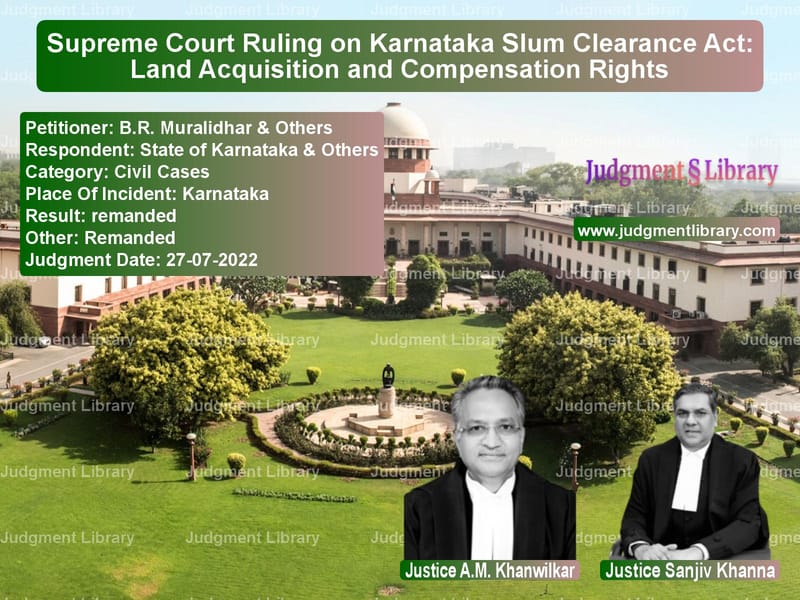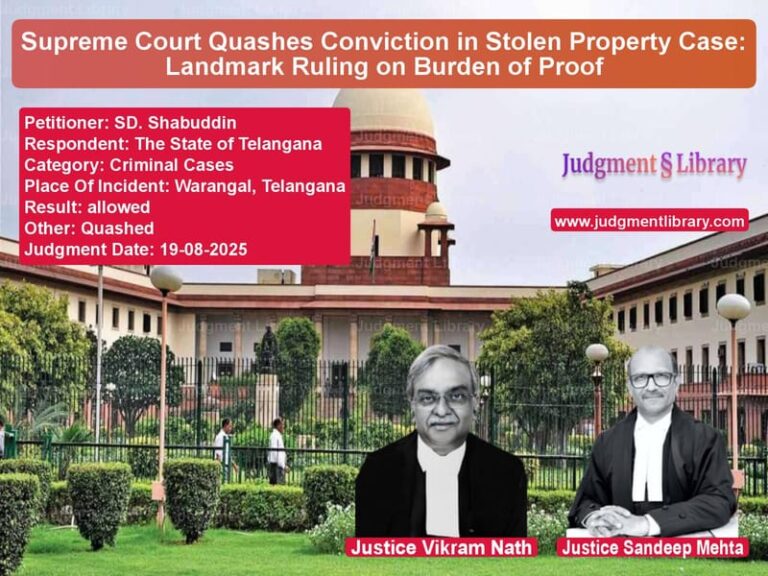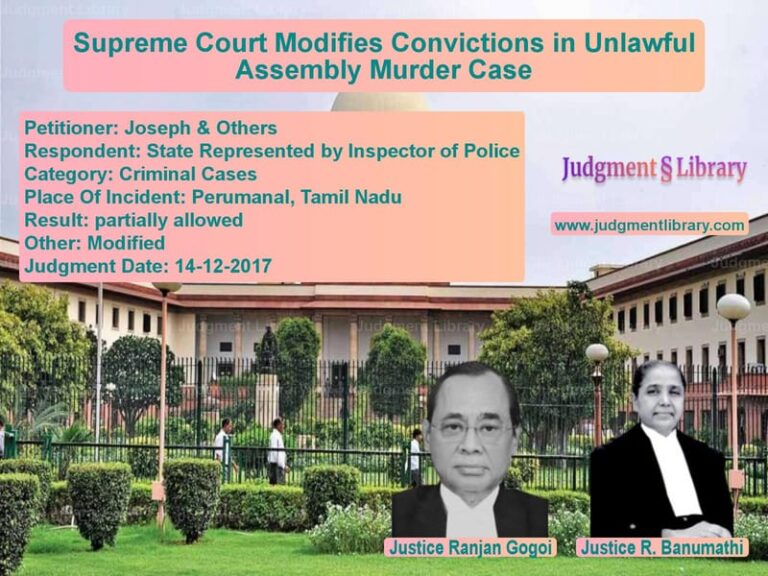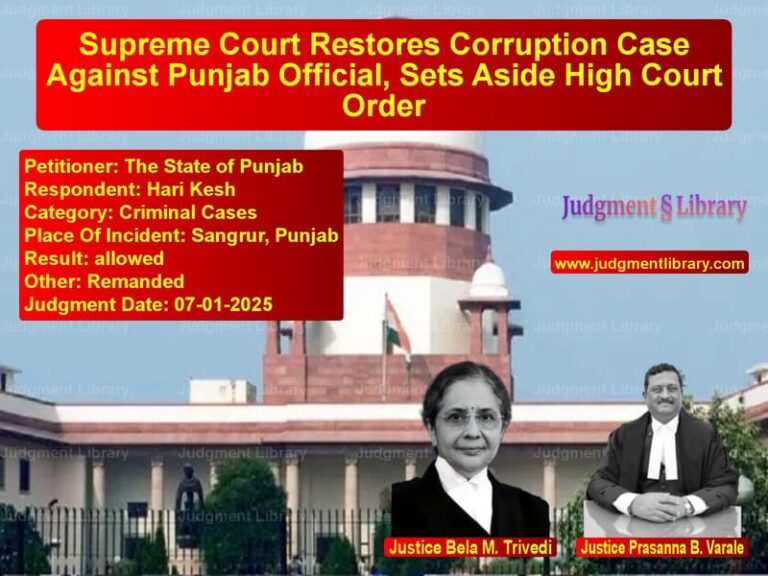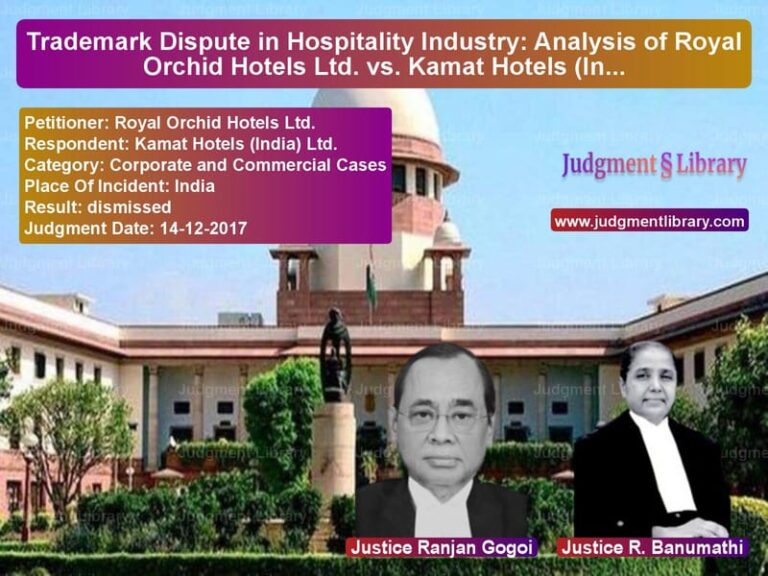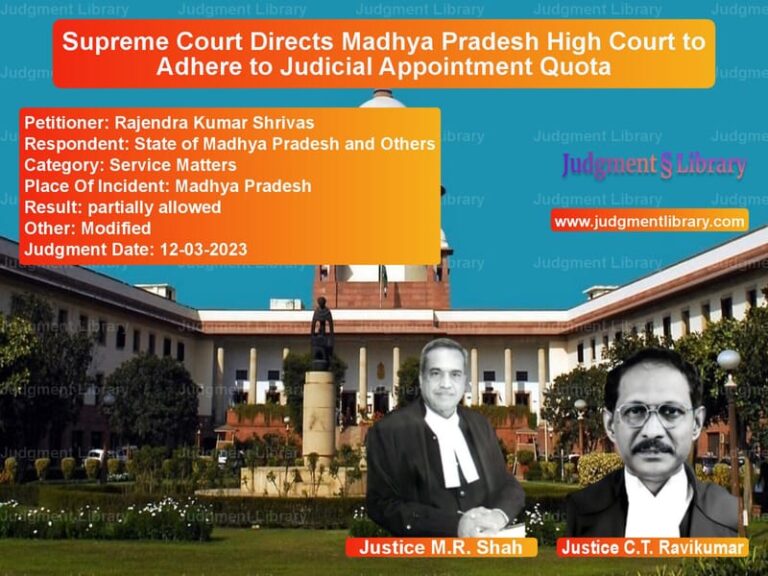Supreme Court Ruling on Karnataka Slum Clearance Act: Land Acquisition and Compensation Rights
The Supreme Court of India, in a significant ruling, examined the constitutionality of Section 20 of the Karnataka Slum Areas (Improvement and Clearance) Act, 1973, which governs the process of land acquisition for slum rehabilitation and improvement. This judgment sheds light on the fairness of compensation methods adopted by the state and the balance between public welfare and individual property rights.
Background of the Case
The dispute arose when the Government of Karnataka issued a notification dated 23.06.2005 under Section 17 of the Karnataka Slum Areas Act, acquiring land for rehabilitation and development of slum dwellers. The petitioners, including B.R. Muralidhar and others, challenged this acquisition on the grounds that the compensation method prescribed in the Act was inadequate and unconstitutional.
According to the petitioners, the Act stipulated that compensation for acquired land would be determined based on three hundred times the annual property tax, an approach that significantly undervalued their properties. They contended that such a method deprived them of fair market value and violated their constitutional right to property under Article 300A.
Read also: https://judgmentlibrary.com/supreme-court-rules-on-karnataka-housing-board-land-acquisition-dispute/
Petitioners’ Arguments
- The method of computing compensation using property tax valuation does not reflect the true market value of the land.
- Such compensation results in an arbitrary and unjust payment to landowners, violating their fundamental rights.
- The prolonged delay in the acquisition process—starting in 1982 and culminating in a final notification only in 2005—exacerbated the unfairness.
- The Act, by failing to provide a reasonable compensation mechanism, did not align with established constitutional principles.
Respondents’ Arguments
- The state justified the land acquisition by arguing that the Karnataka Slum Areas Act aimed to improve living conditions for slum dwellers, which is in line with Directive Principles of State Policy.
- The compensation method was framed as per legislative intent to balance public interest and state resources.
- The respondents claimed that the law was protected under Article 31C of the Constitution, which safeguards laws implementing Directive Principles from being challenged under fundamental rights.
- They further contended that the property tax-based valuation method was a reasonable and legitimate mechanism for determining compensation.
Supreme Court’s Observations
The Supreme Court critically analyzed the compensation method and constitutional validity of Section 20 of the Karnataka Slum Areas Act.
- The Court observed that the method of compensation should be just, reasonable, and in accordance with principles established under the Right to Fair Compensation and Transparency in Land Acquisition, Rehabilitation and Resettlement Act, 2013.
- The Court acknowledged that different laws prescribe different mechanisms for land acquisition compensation, but such mechanisms must align with fairness and reasonableness.
- The provision in question failed to consider the actual market value of the land, thereby creating an imbalance in the rights of landowners.
- The High Court had previously declared Section 20 unconstitutional without thoroughly analyzing legislative intent and compensatory principles.
- The Court also noted that the delayed process of land acquisition further weakened the respondents’ arguments about its necessity.
Legal Precedents Considered
- K.T. Plantation Pvt. Ltd. vs. State of Karnataka (2011): Affirmed that compensation for land acquisition must be just and not illusory.
- Indore Development Authority vs. Manoharlal (2020): Reinforced that landowners are entitled to fair compensation in line with contemporary property valuation principles.
- State of Tamil Nadu vs. Ananthi Ammal (1995): Highlighted the importance of balancing social welfare with constitutional protections of property rights.
Supreme Court’s Final Ruling
The Supreme Court set aside the High Court’s ruling and remanded the case for reconsideration with specific directives:
- The High Court must reassess whether the compensation method under Section 20 provides a fair and just valuation.
- The government should consider revising the methodology for determining compensation to align with market values.
- Pending further review, Section 20 remains applicable, but the government must exercise caution in implementing land acquisition.
- Future acquisitions should be carried out with enhanced clarity and fairness in compensation calculations.
Implications of the Judgment
The Supreme Court’s ruling has far-reaching implications:
- Property Rights Protection: Ensures landowners are not deprived of fair compensation due to arbitrary legal provisions.
- Judicial Scrutiny: Reinforces the necessity of fair judicial assessment of laws that impact private property rights.
- Legislative Review: Encourages governments to revise outdated compensation models and bring them in line with contemporary economic principles.
- Impact on Slum Rehabilitation: Highlights the need to balance social welfare projects with the rights of landowners.
This judgment underscores the principle that land acquisition, even for public purposes, must be done in a manner that is just, fair, and constitutionally sound.
Petitioner Name: B.R. Muralidhar & Others.Respondent Name: State of Karnataka & Others.Judgment By: Justice A.M. Khanwilkar, Justice Sanjiv Khanna.Place Of Incident: Karnataka.Judgment Date: 27-07-2022.
Don’t miss out on the full details! Download the complete judgment in PDF format below and gain valuable insights instantly!
Download Judgment: b.r.-muralidhar-&-ot-vs-state-of-karnataka-&-supreme-court-of-india-judgment-dated-27-07-2022.pdf
Directly Download Judgment: Directly download this Judgment
See all petitions in Property Disputes
See all petitions in Landlord-Tenant Disputes
See all petitions in Damages and Compensation
See all petitions in Constitution Interpretation
See all petitions in Judgment by A M Khanwilkar
See all petitions in Judgment by Sanjiv Khanna
See all petitions in Remanded
See all petitions in Remanded
See all petitions in supreme court of India judgments July 2022
See all petitions in 2022 judgments
See all posts in Civil Cases Category
See all allowed petitions in Civil Cases Category
See all Dismissed petitions in Civil Cases Category
See all partially allowed petitions in Civil Cases Category

